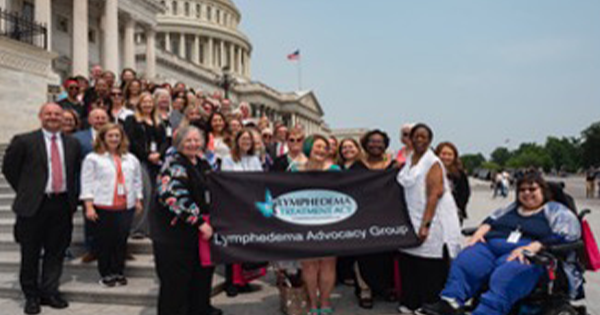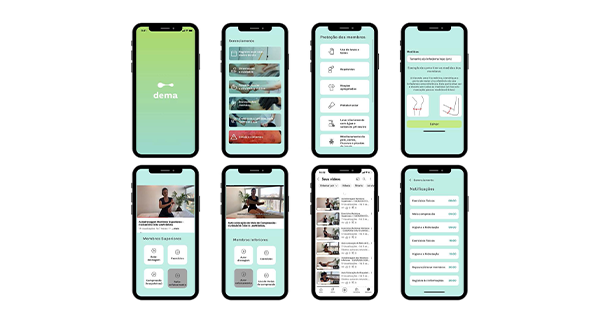Svenska Ödemförbundet (SÖF; The Swedish Association of Chronic Oedema) was founded in 1999 by patients and next-of-kin who wanted to contribute to a Swedish Health Care Plan for Lymphoedema, initiated by the Swedish Cancer Society. Patients who had received treatment with decongestive lymphatic therapy (DLT), patient education and self-management on how to live with lymphoedema had succeeded with an acceptable quality of life. The self-management training had been carried out with the assistance of skilled medical lymphoedema therapists while other patients had been offered only compression garments and could only verify small improvements of their lymphoedema problems. The swelling was temporarily reduced with compression but the patients had not received training on how to increase the movement of the lymph fluid. SÖF collaborated with medical lymphoedema therapists who taught patients how to learn to accept, adapt, use self-management and plan a life with lymphoedema. Instructions were written, oral and carried out in practice for easier learning. Quality of life was documented continuously.
I was active in SÖF although I lived abroad. I was involved in the advocacy group, arranged meetings with decision makers, region, parliament and government representatives to make them aware of the lack of competence and knowledge of lymphoedema in the healthcare system. SÖF strived for implementing education and training in healthcare, as well as innovative diagnostic and treatment methods for primary and secondary lymphoedema sufferers.
SÖF received funding 2008 to investigate diagnostic and treatment methods at Flinders University Clinic in South Australia. A report was sent to the Swedish Community and Regions on the person-centred measuring, diagnostic and treatment methods used by Professor Neil Piller, Flinders University, comparing with the Swedish Lymphoedema Care Plan, which had been drafted without including patients’ perspectives and experiences and a referral process. The report initiated some changes in the Stockholm region but with a totally standardised format for treatment.
The clinical advisor for SÖF, Helena Janlöv Remnerud, and I participated at the first International Lymphoedema Framework (ILF) conference and were impressed by the co-creation between patients, professionals, researchers and life-science/Medtech companies. Inpired by the 1st ILF conference, SÖF produced a number of folders to inform patients and physicians about lymphoedema and also started up a continous series of seminars and workshops for the patients to get aquainted with what they can do for themselves.
We became members of the ILF Education Committee and drafted the Lymphoedema Education Benchmark Statements (LEBS) Benchmarks (ILF, 2018). The Benchmarks were developed for leaders for undergraduate programmes of education in healthcare. SÖF tried to involve professionals in Sweden to join us in a Swedish Lymphoedema Framework but without success.
We strived to include science and to measure patient’s perspectives and experiences in all SÖF activities. SÖF introduced workshops and seminars for members, physicians and educators. During the Covid-19 pandemic, the workshops were replaced with seminars and this continued afterwards. We organised 15–20 webinars each year between 2020 and 2024. We reported the outcomes to decision-makers, researchers, health care organisations, clinicians and professionals.
SÖF won the Best Poster Award at the ILF conference 2011 and 2018. The posters were adapted to the Swedish Health Care System, updated and presented at Scientific Conferences for Oncology 2015 and 2016, EURORDIS 2020, Nurses in School Care 2021, Swedish Association for Primary Care 2021 and Swedish Association of Lymphology 2023.
SÖF also continuously organised training for physicians, researchers and politicians in the Swedish Parliament and for the Swedish Department of Health Care. SÖF has been represented in updating the National Cancer Rehabilitation Plan 2016–2024, a project within Regional Cancer Centres (RCCs) in collaboration which included the only existing nationally designed and approved ‘Lymphoedema Plan’. The Lymphoedema Care Programme has been drafted and updated by the Swedish Association of Lymphology but has not been subject to a referral procedure (the proposed updates have not been sent out to clinicians, physicians, professionals, patient organisations. It has been updated by the association and printed on the website for the Swedish Association of Lymphology as the National Lymphoedema Care Programme.)
An article was published in Wounds International in 2015 on Lympho-logical thinking in self-management of lymphoedema (Remnerud and Haag, 2015), which was the main theme for SÖF at our week-end workshops between 2013 and 2023. When evaluating the workshops, anecdotally, patients often praise them, along the lines of: “This week-end has changed my life”, “Now I know how to treat my lymphoedema”, “You have saved my life” and “I feel better and can treat my lipoedema”.
SÖF has been active in patient advocacy since 2008 In Nordic, European and international collaboration and have designed a website for children with lymphoedema, compression and lipoedema policies for our sister organisations in Europe. We have also handed over a European Manifesto to the European Ministers of Health at the World Lymphoedema Day on March 6 and a Manifesto of Lipoedema at the World Lipoedema Day on June 11.
The collaboration between the European patient organisations is intense and we work together in EURORDIS – VASCERN (The European Reference Network on Rare Multisystemic Vascular Diseases) for paediatric and primary lymphoedema (European Reference Network, 2025).
Our patient advocacy has become more influential since becoming members of the Swedish Network of Cancer in 2012 and becoming involved in most governmental working, focus and reference groups for cancer, EU Beating Cancer Plan, digitalisation, CCI (Cancer Infrastructure), ECHoS (Cancer Mission Hubs), EUnetCCC (European Network for CCC:s), Rare Diseases, Co-lead for ECPDC (European Cancer Patients´Digital Centre) for measuring, documenting, evaluating Quality of Life from investigation, diagnosis, treatment, rehabilitation and survivorship), in advisory groups for AMB@R, a EU-project for digital cancer rehabilitation, PROMISE (a research project for proteomics and innovative cancer treatment), as well as our active membership of OECI (European Organisation for CCC), CPE (Cancer Patients Europe) and EPF (European Patient Forum).
I was a member of a research project on ‘Patient and next-of-kin co-creation for better research and health care’. It resulted in a report which has been discussed at various conferences and meetings with researchers, clinicians and politicians across the world — from Brussels to Barcelona, from Stockholm to Washington, we have raised patients’ voices wherever decision making has been made. The recommendations of the report will be discussed at the Nordic Summit in ESMO in Berlin in October 2025.
Clinicians need to understand the patient perspective, as well as the patient needs to understand the healthcare and the research systems. The development for lymphatic problems still needs focus and research in Sweden. We lack education, training, specialists and research in lymphology, lymphoedema, lipoedema and Dercum’s disease, although SÖF funds small studies every year. The patient advocate has become a patient partner in research and healthcare internationally and we hope it will become a reality in the Swedish lymphoedema world.
Including a patient partner in research and in developing healthcare is vital for quality broadbased holistic integrated research and for excellent healthcare and optimal outcomes for patients. We know that the future requires more research, more specialists and more collaboration. But we also know that the patients are one of the strongest resources in healthcare. It is with them — and for them — that we continue our voluntary work.
Some posters that SÖF and its partners have shown at various scientific conferences can be found here: https://svenskaodemforbundet.se/posters/





